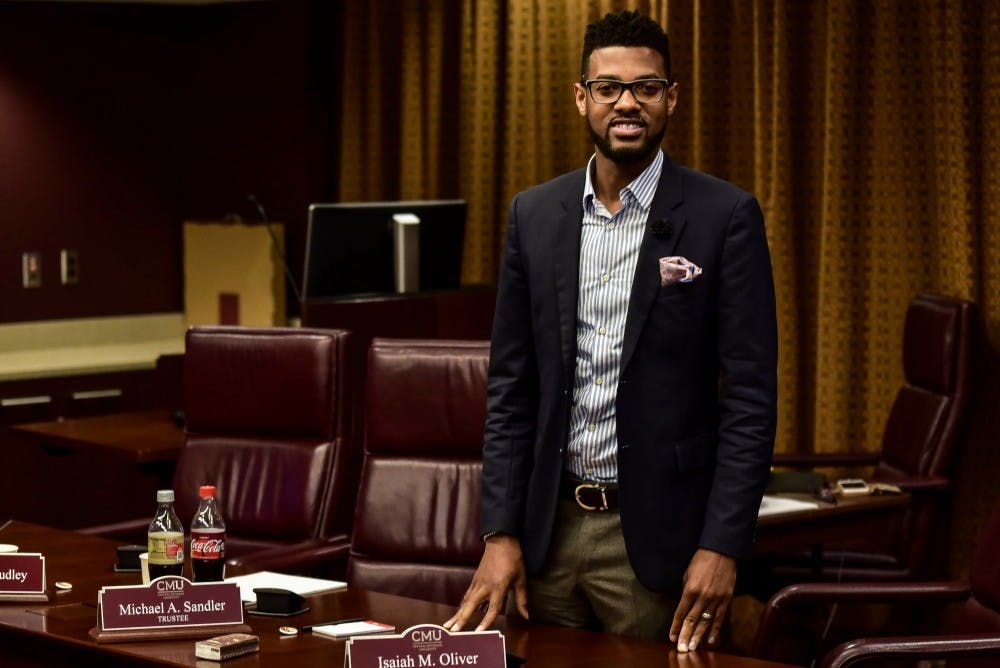Q&A: Newest trustee discusses his commitment to serving CMU

Board of Trustees member Isaiah Oliver attends his third meeting Sept. 19 in the President's Conference Room in the Bovee University Center.
Isaiah Oliver sat in a leather office chair alongside seven other trustees for only the second time Sept. 19, but the youngest current trustee said it felt like his tenth.
Oliver was appointed to the Central Michigan University Board of Trustees by Gov. Gretchen Whitmer earlier this year. The CMU alumnus earned undergraduate degree in graphic design from the university in 2007. He is currently the president and CEO at Community Foundation of Greater Flint, a public charity created to serve the people of Genesee County.
“The culture of this board is one of learning and inclusion,” Board chair Tricia Keith said. “The Board of Trustees is a living entity that continues to evolve, and (Oliver) has added value to the board.”
Oliver sat down with Central Michigan Life following a Board of Trustees meeting Sept. 19 to discuss his commitment to serve and the experiences he brings to the board.
CM Life: Why did you want to be a trustee?
Oliver: I’ve committed much of my volunteer time to serving public institutions that served a special place in my life. I previously served on the public hospital board where my wife and children were born and in the public school district to which my wife and I are alumni. Now, I have an opportunity to serve an organization that played a pivotal role in my development and challenged my assumptions about life and engagement. It shaped me into the person, professional and father I am. My commitment to CMU falls in line with my commitment to serve the public institutions that hold a special place in my heart.
How has been your experience as a trustee been so far?
The board, campus and executive team have been very welcoming and helpful in filling gaps. I have enjoyed the learning experience. I plan to continue learning (about) the organization. And the campus community is going to continue to evolve. My leadership in this space is going to evolve, but I’m loving it right now.
What new perspectives do you bring to the Board of Trustees?
I think sometimes people say “young trustee” or “trustee of color.” No, I am a CMU Trustee, and I bring some lived experience. The intersectionality that I bring to the table is very different than other trustees because I am a person of color and the youngest trustee. But I am also a father and a husband, and I am resident of the city of Flint in Genesee County. I bring all of those perspectives to the table. The eight trustees have so many different positions and perspectives (they bring) to the table. That diversity is going to make us a strong board.
What experience do you bring as a person who has worked in education and community service?
Everyone has a set of experiences they bring to the table. My K-12 experience came out yesterday as we discussed what we provide on campus, retention of students and creating engaging environments. I was able to relate it to my experiences in the K-12 system because you are always thinking about where students are coming from and going. At the college, we need to be thinking about the same thing.
How do you think CMU can improve? Which areas are most important to you?
What is important is enrollment and retention of student. I also love the work we are doing to explore equity and inclusion. At some point, we need to take the data we have and disaggregate it to find out where our students aren’t succeeding, where the disparities exist and focus our resources on closing the gaps. That way, we move the organization forward. Part of our work is finding the challenges and barriers to success. Then we will be able to provide students with the opportunities to explore a quality education that we are attempting to provide.
How important are students’ voices to the Board of Trustees?
Our primary audiences are our customers and stakeholders. And, by function of the work we do, we do two things: we provide quality learning experiences for students on campus, and we have a responsibility to ensure those students get to those opportunities and have the best conditions for embracing that learning. A byproduct to that is we hire people and engage staff, but our primary audience is the students. So, if we aren’t engaging with them and aren’t respected in the decisions we make, we’re missing the boat. Students are vital and an important part of our decision-making process. We should find ways to engage them, which is why I enjoy being a part of the student-liaison committee.





